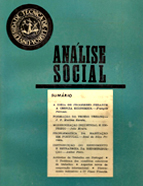

................................
The testimony given by Sedas Nunes in issue 100 of Análise Social is a fundamental autobiographical piece for understanding the trajectory of the magazine and the role that historical studies came to play in it, especially from the late 1970s onwards. As Sedas Nunes explains, the difficulty of obtaining and constructing statistical data and primary sources essential to the work of social scientists created a natural attraction for the reconstruction of historical series of information on the recent evolution of Portuguese society in its multiple dimensions (demographic, social, economic, political, cultural, etc.), in search of well-founded explanations for continuities and changes underway. The crucial place that history came to occupy in the privileged dialogue with the social sciences was therefore an intellectual achievement resulting from the opening up of Portuguese society after the 1974 revolution.
However, before 1974, it cannot be said that history occupied a place of choice in the functioning structure of the GIS or in the publication priorities of Análise Social . Nor could it be expected to be otherwise. The editorial purpose defined at the launch of the journal was very clear in establishing its self-classification as a social studies journal aimed at promoting research in the social field. The index of works published in Análise Social between January 1963 and December 1974 lists a total of 265 articles and research notes, of which only 13 (i.e. about 5%) are classified as “Historical Studies”, within a generic category of studies on the “Structure and Evolution of Portuguese Society”.
History was therefore not a strategic area of publication in the first decade of Análise Social ’s existence. The journal affirmed its unique place in social science research by dedicating a privileged space to the dissemination of scientific work in the fields of economics and sociology of development, labour, employment, unemployment and productivity, income distribution and wage policies, housing, cities and urban policies, demography, family and family policies, welfare, social security and social policies, industrialisation and social organisation of companies, emigration, education, universities, educational policies and scientific and technological research. Particularly noteworthy were the theoretical reflections on ontological and methodological problems in the social sciences and interdisciplinary studies on the social, economic and political structures of Portuguese society in the early second half of the 20 th century.
This work is financed by national funds through FCT - Foundation for Science and Technology, I.P, in the scope of the projects UIDB/04311/2020 and UIDP/04311/2020.
